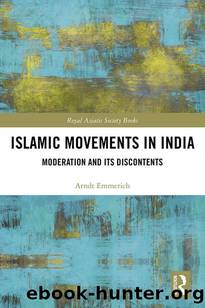Islamic Movements in India (Royal Asiatic Society Books) by Arndt-Walter Emmerich

Author:Arndt-Walter Emmerich [Emmerich, Arndt-Walter]
Language: eng
Format: epub
ISBN: 9781000706239
Publisher: Taylor and Francis
Published: 2019-11-10T18:30:00+00:00
During the speeches, PFI cadres distributed a pamphlet entitled â6 December 1992: Lest we forgetâ. Its content firmly stated that:
Asking Muslims to forget about Babri Masjid is adding insult to injury. Not a single citizen of this great nation, let alone Muslims, will forget about Babri. Forgetting an unspeakable tragedy would only help the growth of communalism and fascism.
This brief excerpt mirrors the campaignâs objective for the PFI. PFI members used phrases such as âwhoever is fighting for the cause of Babri Masjid will receive support and help from the PFIâ; âwe will ensure that even a newborn child will know about the story of the Mosqueâ; âthe history of Babri will be imparted into generation after generation, until we get justiceâ; or the PFI makes sure to reach âevery nook and corner of the country, educating the masses about the Babri issuesâ. By reminding Muslims of the traumatic Babri Masjid destruction and the violent political context in which it occurred, groups such as the PFI contribute to what researchers of the Holocaust have called a âpost memoryâ that is âa generational structure of transmission embedded in multiple forms of mediationâ (Hirsch 2012: 35). Often, these highly individual and emotional accounts carry sentiments of personal loss and severe humiliation by the actual destruction of the mosque (given the symbolic meaning as a house of God and the Prophet), but also by the public demand to forget and forgive. Such narratives of emotional injury are similar to what Mahmood (2009: 845â846) described in her fieldwork in Cairo after the Danish cartoon controversy: âI was struck by the sense of many devout Muslims on hearing about or seeing the cartoons. While many of those I interviewed condemned the violent demonstrations, they nonetheless expressed a sense of grief and sorrow.â One of Mahmoodâs interviewees told her that âthe idea that we should just get over this hurt makes me so mad: if [Christians] donât feel offended by how Jesus is presented, why do they expect that all of us should feel the sameâ.
Sentiments of hurt, anger and moral injury with respect to religious symbols such as the Prophet or the mosque are neglected within social science, but can trigger various forms of collective and individual actions and are effectively utilised by the PFI leadership for political mobilisation. The next section discusses how PFI activists responded to the BJPâs nomination of Narendra Modi as their candidate for prime minster in 2014.
Download
This site does not store any files on its server. We only index and link to content provided by other sites. Please contact the content providers to delete copyright contents if any and email us, we'll remove relevant links or contents immediately.
The History of Jihad: From Muhammad to ISIS by Spencer Robert(2621)
Nine Parts of Desire by Geraldine Brooks(2361)
The Turkish Psychedelic Explosion by Daniel Spicer(2355)
The First Muslim The Story of Muhammad by Lesley Hazleton(2268)
The Essential Rumi by Coleman Barks(2043)
1453 by Roger Crowley(2023)
The Last Mughal by William Dalrymple(1855)
Trickster Travels: A Sixteenth-Century Muslim Between Worlds by Davis Natalie Zemon(1847)
Muhammad: His Life Based on the Earliest Sources by Martin Lings(1644)
God by Aslan Reza(1639)
by Christianity & Islam(1628)
A Concise History of Sunnis and Shi'is by John McHugo(1567)
No God But God by Reza Aslan(1540)
Magic and Divination in Early Islam by Emilie Savage-Smith;(1533)
The Flight of the Intellectuals by Berman Paul(1501)
Nothing to Envy by Barbara Demick(1445)
Art of Betrayal by Gordon Corera(1429)
What the Qur'an Meant by Garry Wills(1391)
Getting Jesus Right: How Muslims Get Jesus and Islam Wrong by James A Beverley & Craig A Evans(1340)
